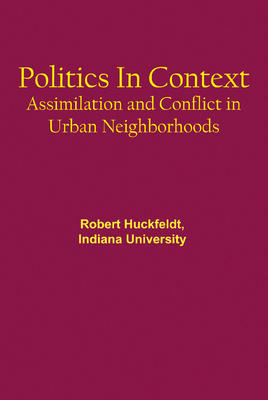
Sound Bite
Neighborhood social contexts have important political consequences, not only for individual behavior but also for the political vitality of groups in the political process. Social class politics is group politics; group politics cannot be explained on the basis of individual interests and predispositions alone; and thus the social contexts of group members must be taken into account in order to explain group politics.
About the Author
Robert Huckfeldt is a faculty member in the Department of Political Science at the University of California at Davis. His teaching and research interests lie in the areas of electoral politics, urban politics, political participation, political communication, and public opinion.
|
|
About the Book
Political opinions and the behavior of individuals cannot be explained apart from the environments within which they occur. Individual characteristics alone do not determine political actions and opinions. Rather, political...
Political opinions and the behavior of individuals cannot be explained apart from the environments within which they occur. Individual characteristics alone do not determine political actions and opinions. Rather, political behavior must be understood in terms of the actor's relationship to the environment, and the environmental factors that impinge on individual choice.(From the Introduction) "The central argument of this book is that neighborhood social contexts have important political consequences, not only for individual behavior but also for the political vitality of groups in the political process. This argument has nothing to do with suburbanization, or with the embourgeoisement thesis as it is traditionally constructed. The embourgeoisement explanation for the disappearance of class politics argues that improved working conditions, better pay, and suburban living create a working class that is infused by middle class values and a middle class lifestyle. Especially in terms of residential location, a suburban residence produces changed values and, along with these changed values, an entirely different set of political viewpoints.The embourgeoisement viewpoint has been attacked on a number of fronts. …[T]he move to suburbia did not necessarily result in the inculcation of middle class values, or in the rise of Republicanism, or in the diminution of class loyalty.The present effort does not dispute these results: there is no reason to believe that individual affluence or suburban residence should necessarily diminish class loyalties or political differentiation along class lines. It is argued that: (1) social class politics is, first and foremost, group politics (Hamilton, 1972); (2) group politics cannot be explained on the basis of individual interests and predispositions alone; and thus (3) the social contexts of group members must be taken into account in order to explain group politics.The important point is that group membership and group politics should not be wholly conceived as the consequence of individual characteristics and individual circumstances. Belonging to a group involves patterns of relations that bind the individual to the group: the very words provoke an image of strong social ties."
|
CONTENTS 1. An Introduction to Politics in Context 2. Assimilation and Conflict in Urban Contexts 3. Contextual Constraints on Friendship Choice 4. Individual and Contextual Ba
CONTENTS 1. An Introduction to Politics in Context 2. Assimilation and Conflict in Urban Contexts 3. Contextual Constraints on Friendship Choice 4. Individual and Contextual Bases of Partisan Attachment 5. The Contextual Basis for Ethnic Politics 6. Neighborhood Influences on White Flight and Residential Satisfaction 7. The Social Context of Political Participation 8. Assimilation, Conflict, and the Mechanisms of Contextual Influence 9. Assimilation, Conflict, and Tipping Points 10. Conclusions and Consequences Appendix A: The Data Base for This Study Appendix B: Methodological Pitfalls and Goals Appendix C: The Model of Friendship Choice Appendix D: The Logit Model Notes References Index
|
"An important and stimulating volume...deserves very careful reading not only for its empirical and theoretical contributions, but also in its role as a sound criticism of a considerable amount of... | More »
"An important and stimulating volume...deserves very careful reading not only for its empirical and theoretical contributions, but also in its role as a sound criticism of a considerable amount of social science research. The implications of his findings and assertions go far beyond the specific communities he studies. Huckfeldt forces a reexamination of underlying assumptions and theoretical constructs."
--The Journal of Politics, February, 1987
|
|
Pages 200
Year: 1986
LC Classification: HN80.B9H83
Dewey code: 307.3’362
BISAC: SOC026000
Soft Cover
ISBN: 978-0-87586-068-8
Price: USD 21.00
Hard Cover
ISBN: 978-0-87586-067-1
Price: USD 38.00
Ebook
ISBN: 978-0-87586-275-0
Price: USD 38.00
|













